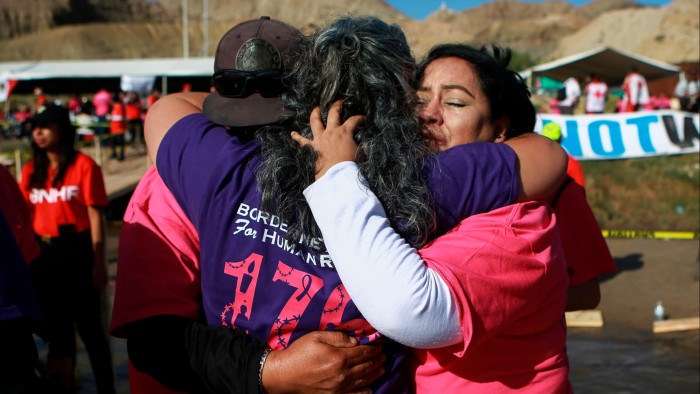Donald Trump’s victory in November’s US presidential election was based, in part, on controversial promises to deport migrants en masse, defend states’ rights to restrict abortion, and roll back affirmative action and other anti-discrimination policies.
This agenda has provoked a wave of trepidation among pro bono lawyers working in these and other contentious areas of civil rights.
“There are going to be fewer checks on presidential action,” argues Susan Hoffman, partner at Crowell & Moring, where she promotes and supervises pro bono work undertaken by the firm’s attorneys. “The courts are one of our last hopes. Getting in as soon as possible is important before other [judicial] appointments are made.”
Hoffman predicts “dramatic change” to immigration policies under Trump, who, in the wake of the election, has signalled his determination to push ahead with plans to deport millions of undocumented migrants.
The firm has been pushing its clients to “get their applications on file” and advising them to keep records of their applications, along with a list of their rights, says Hoffman.
They should have clear, established documentation of their status to hand, she reasons, to be ready if the new administration does launch mass round-ups.
Such concerns echo protracted pro bono work by lawyers at Arnold & Porter to secure damages for families separated at the US-Mexico border in 2018, under the Trump administration’s subsequently abandoned “separation policy”. This authorised the removal of children from parents entering the country illegally.
In July, after five years of litigation, a federal judge in Arizona awarded $1.35mn to a group of claimants comprising five mothers and their children represented by the firm. The defence had contended that damages should not apply to trauma caused by federal officials enforcing government policies.
That settlement, alongside a similar-sized award granted by the same judge in May to other families who had also been separated in Arizona in 2018, provided a blueprint for those seeking compensation with similar claims, according to Diana Reiter, a partner in Arnold & Porter’s New York office.
Now, another wave of radical action against migrants may be on the horizon. But, whatever actions the next Trump administration takes to deliver on its deportation promises, “the firm has a long history of pro bono work committed to the protection of the rule of law — we expect that work to continue”, Reiter says.
In a year marked by febrile campaigning and political division, pro bono lawyers have continued to achieve welcome, if sometimes modest, changes on behalf of clients.
For example, in April, Crowell & Moring, alongside other campaign groups, secured a public apology for previous discrimination against Black voters in Federalsburg, Maryland. They also secured undertakings for fairer elections in a broad settlement with the town.
That settlement was concluded well before the election and the changes implemented “are solid,” Hoffman says.
Pro bono cases have also confronted Joe Biden’s federal administration.
King & Spalding worked this year with others to sue the US Department of Defense for failing to amend automatically the records of veterans who were denied a full honourable discharge because of their sexual identity. This has happened under the military’s long-abandoned “don’t ask, don’t tell” policy and previous codes.
“What we really want is for people to have discharge papers that don’t ‘out’ them every time they try to use them,” says Radha Sathe Manthe, pro bono practice deputy at King & Spalding in Atlanta.
In June, a California court declined an attempt by the Department of Defense to dismiss action aimed at securing those affected the same veteran benefits as those who were given full honourable discharges.
As of October, the US government confirmed it had amended papers to confirm full honourable discharge status for nearly all those affected under “don’t ask, don’t tell” rules.
The impact of recent Supreme Court judgments continues to preoccupy pro bono practitioners, as well. Hoffman says that the justices’ 2023 decision to overturn the use of affirmative action in colleges has had a chilling effect on other organisations and businesses seeking to earmark spots for disadvantaged minorities through diversity programmes.
Hostile rhetoric on the topic, and the recent scaling back of such policies in the corporate world, prompted her to warn some clients to review their diversity and inclusion initiatives, to make them less vulnerable to legal attack.
And the Supreme Court’s 2022 decision to overturn Roe vs Wade, which had guaranteed the constitutional right to an abortion, presents an even more politically divisive fracture. Many Republican-led states have raced to impose ever-tighter restrictions on the procedure during the tail-end of Biden’s presidency. On abortion rights, Hoffman says: “We will have to be primed.”
Hoffman concedes, however, that lawyers are not monolithically opposed to Trump’s anticipated civil rights agenda — including a few at her own firm.
While she believes Crowell will not waver in pursuing pro bono work in these contested fields, she has concerns that some firms may pull back.
After the election, Hoffman met up in Washington DC with a group of lawyers who manage the pro bono practices at their firms.
The question “Do you think you’re going to get any pushback from management in your firm?” was asked, she says. “Frankly, some firms’ lawyers said: ‘Yes, we have to watch what we do.’”
Case studies: read about the most innovative services that lawyers have developed for clients, plus the top law firm practitioners here.
Read the full article here

